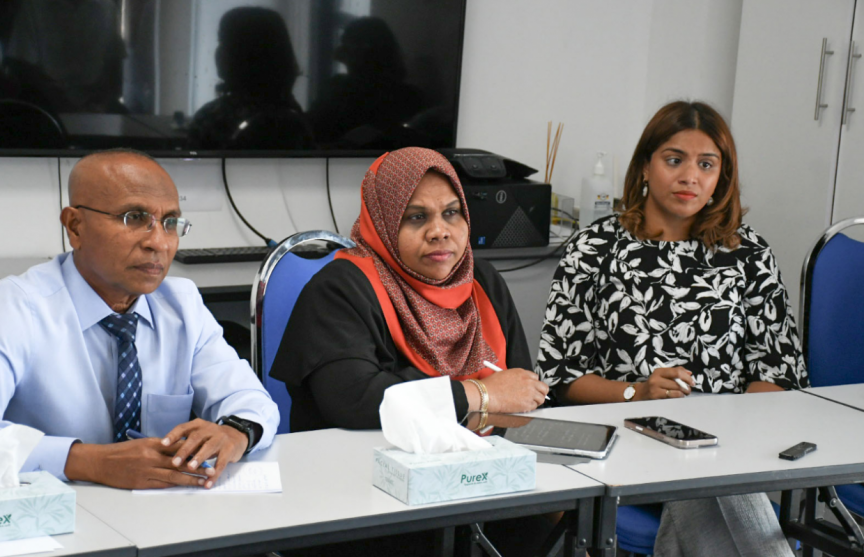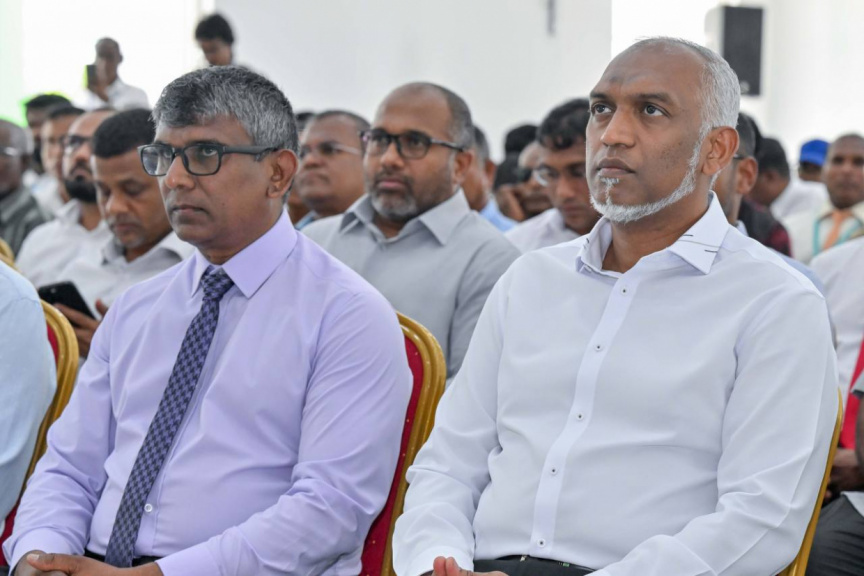
HRCM's president Mariyam Muna (C) leads a press briefing.
The Human Rights Commission of Maldives (HRCM) stated on Monday that the media bill currently in Parliament, which aims to give the government control over media, contains significantly harsh measures that restrict freedom of the press and expression.
The HRCM's submitted opinions on the media bill highlight that some of its provisions are matters of serious concern to the commission. They further added that the bill includes provisions violating international best practices and severely limiting freedom of expression.
HRCM also emphasized that democratic countries protect freedom of the press and do not view the press as an entity that should be brought under state control.
According to the HRCM, international standards set by the UN Human Rights Committee and the Organization for Security and Cooperation in Europe (OSCE) dictate against imposing licensing or registration requirements or compulsory regulations on online content creators. The commission argued that such a move would hinder freedom of expression and prevent accountable dialogue with the government.

Specifically, the creation of a commission involving the government to regulate the broadcasting sector is not considered best practice.
The Commission proposed maintaining two separate regulatory systems with necessary amendments to the existing Maldives Media Council Act and Broadcasting Act for broadcast and print media, respectively. While acknowledging that both systems would operate under one agency, they proposed regulating print and broadcasting media with necessary distinctions.
HRCM also proposed maintaining a register of news outlets, magazines, and broadcasters. Additionally, they suggested amending the definition of 'magazine' in the current bill to narrow down what qualifies as a magazine.
A key proposal from the HRCM was to not backdate cases and to avoid taking any action based on procedures, responsibilities, and penalties described in previous laws. The new bill in parliament allows the future Media Commission to revisit cases reported up to a year prior.
The HRCM asserted that to determine the truthfulness of information published by news agencies, a judicial role or the opportunity to seek legal assistance is crucial.
However, the commission warned that the threat of action under the bill could make many news agencies reluctant to publish information. The measures outlined in the bill are deemed relatively harsh, and if information is found not to be authentic, action should ideally be based on the published intent.
The HRCM also stated that the Media Commission should be separated from the civil service, as it is not the practice in Maldives to have civil service employees in an independent commission or agency.
As the bill currently stands in parliament, three of the seven members appointed to the commission are to be appointed by the President. The President is also slated to appoint the Chairman of the Commission.
HRCM recommended that the seven members elected to the commission must be nominated and approved by the parliament. The commission stressed that the system should be based on a self-regulatory model. HRCM further proposed that the President and Vice-President of the Commission be appointed by secret ballot among the members of the Commission.
Furthermore, HRCM proposed "holding" the registration of a newspaper or media outlet instead of canceling it until a reported case is resolved or proven.

The bill, moved by government-affiliated Thulhaadhoo MP Abdul Hannan Abubakr, is currently under review by the Independent Institutions Committee. The committee also met with individual journalists on Monday to gather their views on the bill.
Many journalists protested against the bill last week, advocating for its withdrawal.